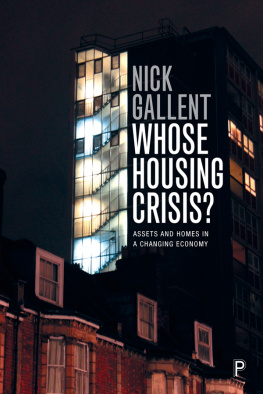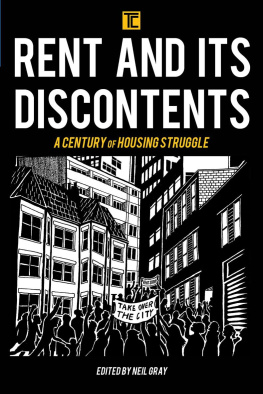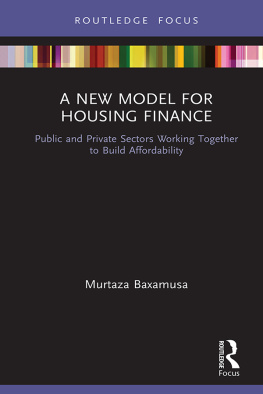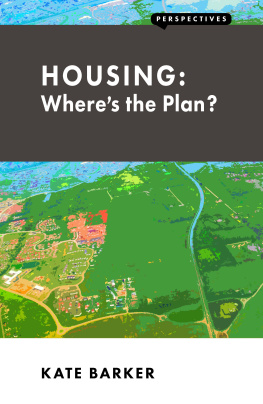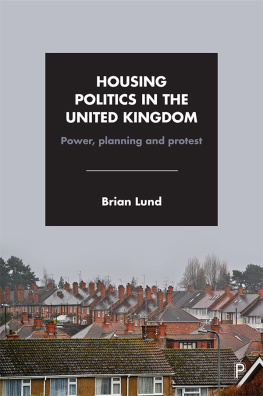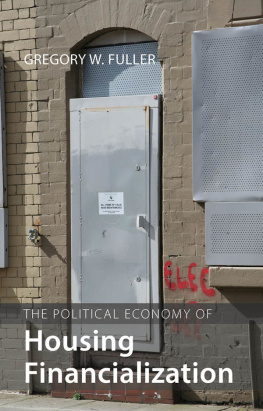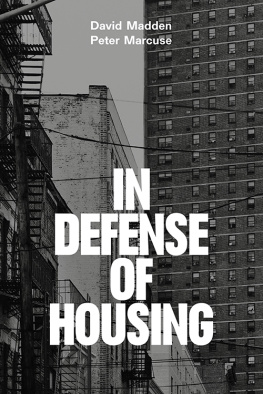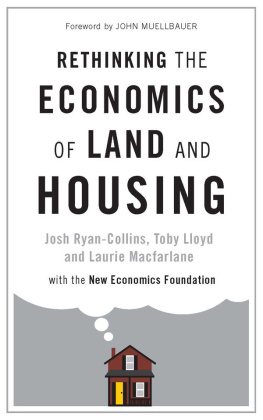WHOSE HOUSING CRISIS?
Assets and homes in
a changing economy
Nick Gallent
First published in Great Britain in 2019 by
Policy Press University of Bristol 1-9 Old Park Hill Bristol BS2 8BB UK Tel +44 (0)117 954 5940 e-mail
North American office: Policy Press c/o The University of Chicago Press 1427 East 60th Street Chicago, IL 60637, USA t: +1 773 702 7700 f: +1 773-702-9756 e:
Policy Press 2019
British Library Cataloguing in Publication Data
A catalogue record for this book is available from the British Library
Library of Congress Cataloging-in-Publication Data
A catalog record for this book has been requested
978-1-4473-4531-2 hardback
978-1-4473-4607-4 paperback
978-1-4473-4606-7 ePdf
978-1-4473-4608-1 ePub
978-1-4473-4609-8 Mobi
The rights of Nick Gallent to be identified as author of this work has been asserted by him in accordance with the Copyright, Designs and Patents Act 1988.
All rights reserved: no part of this publication may be reproduced, stored in a retrieval system, or transmitted in any form or by any means, electronic, mechanical, photocopying, recording, or otherwise without the prior permission of Policy Press.
The statements and opinions contained within this publication are solely those of the editor and contributors and not of the University of Bristol or Policy Press. The University of Bristol and Policy Press disclaim responsibility for any injury to persons or property resulting from any material published in this publication.
Policy Press works to counter discrimination on grounds of gender, race, disability, age and sexuality.
Cover design by Andrew Corbett
Front cover image: Andrew Corbett
Readers Guide
This book has been optimised for PDA.
Tables may have been presented to accommodate this devices limitations.
Image presentation is limited by this devices limitations.
To my daughters, Marta and Elena:
Youve been right all along Its not fair.
Contents
List of figures
Key terms
A small number of terms, specific to housing and planning policy development in England and the UK, are used regularly in this book. Their meaning is noted here for later reference. Acronyms are expanded within the text, and many other terms with meanings that become clear later on are not listed here.
Affordable housing A type of housing (or special product) that is often delivered today as part of a planning agreement with private developers. Affordable housing, for rent or purchase (including starter homes), is included within private housing schemes.
Affordable rent Rent discounted against the full market level. Affordable housing may now be affordable rent, although the level of rent is not related to local earnings.
Buy to let Buying homes to let to others. Also refers to buy-to-let mortgage products.
Community land trust A social-purpose trust established by a community group to hold land on which community infrastructure, including affordable homes, might be built.
Help to buy Government support for first-time buyers in the form of interest-free/low-interest loans designed to aid these buyers entry into the housing market.
Imputed rent An estimate of the monetary value of housing services consumed by households who are not actually renting their homes, equivalent to the rent they would otherwise pay, were they renting.
Land rent Rent paid directly to an owner of land, or ground rent paid to a superior landlord by a lessee.
Residential mortgage-backed securities A tradeable financial product backed by the income derived from residential mortgages.
Right to buy The right given to local authority secure tenants, after 1980, to buy their homes with a discount.
Social rent A nominal rent, usually set well below the market level.
Stamp duty A progressive tax levied on property transactions paid by a house purchaser.
Starter homes Refers to governments recent scheme to include starter homes in market developments, available to purchase at a 20% discount.
Acknowledgements
This is a very sustainable book parts of it have been recycled from previous publications. have some cannibalised ideas from prior contributions to the Journal of Urban Regeneration and Renewal (2016) and Town Planning Review (2018). But for the most part, the book comprises new material and commentary, interwoven with data, tables and graphs adapted from other sources all of which are of course cited.
I am grateful to my recent co-authors Dan Durrant, Neil May and Phoebe Stirling, all at the Bartlett UCL for their immense input into our collaborative ventures, and also to the UCL Grand Challenges team, James Paskins and Ian Scott, for supporting our rethinking housing initiative. I would also like to thank colleagues who have read and commented on different parts of this book and for pointing out the glaring errors and omissions and plain silliness that I have since attempted to correct. Particular thanks go to John Tomaney, John Parr and the anonymous reviewer engaged by Policy Press. I am conscious, however, of not having been able to respond to all comments and suggestions and that the book remains a partial and imperfect account of a hugely complex area of scholarly enquiry, public policy and social experience.
The work of other colleagues and co-authors at UCL, and elsewhere, has also been important over the years in shaping my broader thinking on housing and development debates. These include Mark Tewdwr-Jones, Matthew Carmona, Claudio de Magalhaes, Daniela Ciaffi, Iqbal Hamiduddin, Mark Scott, Menelaos Gkartzios, Mark Bevan, Madhu Satsangi, Dave Shaw, Sue Kidd, Marco Bianconi, Johan Andersson, Cecilia Wong, Rhys Jones, Gwyn Williams, Bill Edwards, Chris Allen, Ed Shepherd, Nicole Gurran, Rebecca Chiu, Sonia Freire Trigo, Meri Juntti and many others. If I havent named you here, Im profusely sorry and will buy you a drink soon.
At Policy Press, Emily Watt encouraged me to write this book. In fact, she made me do it. And while Emily was on maternity leave, Sarah Bird, Sarah Connolly, Laura Cope, Jamie Askew and Leonie Drake kept the project on track. I would also like to thank Sandra Mather at the University of Liverpool. Over the last decade, she has redrawn most of the diagrams and maps that have appeared in my books and articles and everything in this one.
The most important acknowledgement always comes last: to my family, my wife Manuela Madeddu and daughters Marta and Elena, whove tolerated my semi-constant writing in recent years, and the occasional (my wife says regular) accompanying tantrums.
Preface
This is another book about the housing crisis: housing in many parts of the UK has become expensive to rent and nearly impossible to buy for households on low, average and even good incomes. This has a range of consequences which are discussed later on. In this preface, I want to do three things. First, explain the books title and focus; second, outline the basic argument; and third, say something about how the book is structured and why.
Besides taking inspiration from Ray Pahls Whose City? (1975) and its crisp analysis of residential property classes, the title of this book Whose Housing Crisis? is a provocation, which alludes to a crisis broadly shared, and from which no one can ultimately escape, rather than a predicament affecting only those on societys economic fringe. There is a popular notion that bad housing and inequitable housing outcomes affect only a narrow section of society. But this is not so. The housing stresses faced in England and some other parts of the UK today evidence an unsustainable divide between property classes and

